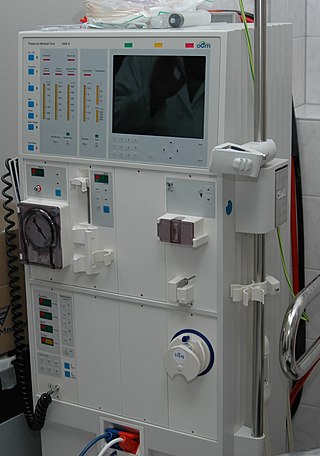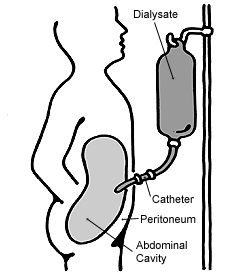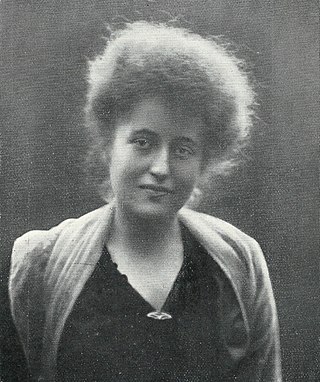Zbylut Twardowski was a Polish-American nephrologist, known for his pioneering work on dialysis. His patented dialysis machines and catheters are commonly found in hospitals and dialysis centers worldwide. Twardowski was associated with the Department of Internal Medicine at the University of Missouri in Columbia, Missouri.

Thomas Graham was a Scottish chemist known for his pioneering work in dialysis and the diffusion of gases. He is regarded as one of the founders of colloid chemistry.

Kidney dialysis is the process of removing excess water, solutes, and toxins from the blood in people whose kidneys can no longer perform these functions naturally. Along with kidney transplantation, it is a type of renal replacement therapy.

Hemodialysis, also spelled haemodialysis, or simply dialysis, is a process of filtering the blood of a person whose kidneys are not working normally. This type of dialysis achieves the extracorporeal removal of waste products such as creatinine and urea and free water from the blood when the kidneys are in a state of kidney failure. Hemodialysis is one of three renal replacement therapies. An alternative method for extracorporeal separation of blood components such as plasma or cells is apheresis.

Peritoneal dialysis (PD) is a type of dialysis that uses the peritoneum in a person's abdomen as the membrane through which fluid and dissolved substances are exchanged with the blood. It is used to remove excess fluid, correct electrolyte problems, and remove toxins in those with kidney failure. Peritoneal dialysis has better outcomes than hemodialysis during the first two years. Other benefits include greater flexibility and better tolerability in those with significant heart disease.

Kazimierz Jerzy Skrzypna-Twardowski was a Polish philosopher, psychologist, logician, and rector of the Lwów University. He was initially affiliated with Alexius Meinong's Graz School of object theory.
The Lwów–Warsaw School was an interdisciplinary school founded by Kazimierz Twardowski in 1895 in Lemberg, Austro-Hungary.

Jan Jakub Twardowski was a Polish poet and Catholic priest. He was a chief Polish representative of contemporary religious lyrics. He wrote short, simple poems, humorous, which often included colloquialisms. He joined observations of nature with philosophical reflections.

Roman Witold Ingarden was a Polish philosopher who worked in aesthetics, ontology, and phenomenology.

Artificial kidney is often a synonym for hemodialyzer, but may also refer to the other renal replacement therapies that are in use and/or in development. This article deals mainly with bio-artificial kidneys featuring cells that are grown from renal cell lines/renal tissue.

Pan Twardowski, also known as Master Twardowski, is a sorcerer in Polish folklore and literature who made a deal with the Devil. Twardowski sold his soul in exchange for special powers – such as being able to summon for King Sigismund Augustus the spirit of his deceased wife – and eventually met a tragic fate.
Marek Twardowski is a Polish sprint canoeist who has competed since the late 1990s. He won fifteen medals at the ICF Canoe Sprint World Championships with two golds, nine silvers, and four bronzes.
Hans Heinrich von Twardowski was a German film actor.
Zbylut is an old Polish given name of Slavic origin built of two parts: zby and lut ("severe").

Kasper Twardowski was a Polish poet of the early Polish Baroque period, representing the so-called metaphysical or metaphysical-and-devotional line of poets. Little is known of his personal life. Twardowski was most likely born in Sambor into the well-off family of the local tailor, and spent his youth in Kraków (Cracow), Poland, where he is assumed to have studied at the Jagiellonian University. In 1629 Twardowski moved probably to Lwów (Lviv), where he died. Twardowski is best known for his erotica called "the Cupid's Lessons", banned by the bishop of Kraków, and later rejected by the poet himself as immoral; blamed for his own poor health as the apparent wrath of God.
Pan Twardowski is a 1921 Polish silent fantasy film directed by Wiktor Biegański and starring Bronisław Oranowski, Wanda Jarszewska and Antoni Nowara-Piekarski. Biegański was hired by the Polish government to make the film in an effort to foster a greater sense of Polish national identity—particularly in the ethnically mixed Upper Silesia. It is one of many films based on the legend of Pan Twardowski, the Polish word "Pan" being a respectable title often given to members of the nobility or diplomats.

Archbishop Bolesław Twardowski was a Roman Catholic prelate, who served as an Auxiliary Bishop of the Roman Catholic Archdiocese of Lviv and a Titular Bishop of Telmessos from 14 September 1918 until 3 August 1923 and as the Metropolitan Archbishop of the same Archdiocese from 3 August 1923 until his death on 22 November 1944.

Ilse von Twardowski or Ilse Twardowski-Conrat (1880–1942) was an Austrian sculptor. She created many noted sculptures. She took her own life in 1942 as a result of the Holocaust.